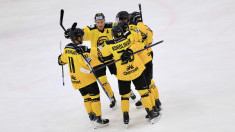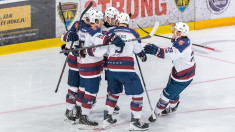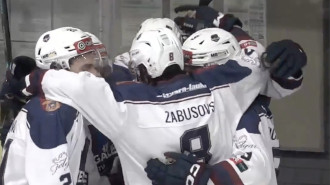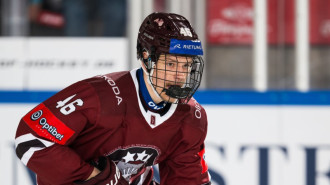Mike Knuble ir latvietis.
iesaku izlasīt. ļoti interesants raksts.
While Mike Knuble and his brother, Steve, plan on taking their mother, Mara, to Latvia as a Mother's Day gift, bringing home the Stanley Cup would only sweeten the equation.
Check out Mike Knuble's highlights
When Mara Knuble climbed onto a boat and fled war-torn Latvia with her mother and grandmother at the age of 4—never to see her father again—she did it as an act of survival, not inspiration.
When she spent five years in a displaced persons camp in Lubeck, Germany, rationing food and waiting for the day she could call America her home, Mara Knuble was seeking opportunity, not appreciation.
When her husband died suddenly at the age of 45, leaving her to raise two teenage boys, Mara Knuble relied on her maternal instincts – and hockey – to provide what was needed.
All along her two sons, Flyers right wing Mike Knuble and his younger brother, Steve, were watching and listening and learning.
“Our goal growing up was to never let our Mom down,” Steve Knuble said Saturday from his home in Huntsville, Ala. “We never wanted her to question the job she did with us.”
Today, Mike Knuble is in Pittsburgh for Game 2 of the Eastern Conference Finals. Steve Knuble is in Huntsville with his wife and two daughters, and Mara Knuble is home in Grand Rapids, Mich., waiting for her Mother’s Day phone calls.
“It’s OK if Mike doesn’t call me,” Mara said. “I know he’s busy there in Pittsburgh. Besides, I already got flowers from them. But it would be nice if Mike scored a goal for me on Mother’s Day.”
No pressure there, Mike. Can’t let Mom down on Mother’s Day, can you?
Actually, Mike and Steve Knuble plan on giving their mother the ultimate gift this summer. They are accompanying her on her first trip back to Riga, Latvia since she left there as a frightened 4-year-old. It will also be Mara Knuble’s first flight on a plane since 1965.
“She hasn’t been to Latvia since the mid 1940s,” Mike Knuble said. “One of the nights before she and her mother escaped she was trapped in a bomb shelter with her family. She’s become claustrophobic and she hates to fly.”
“If you hear about a plane getting halfway to Europe and then turning around, you’ll know it was us,” joked Steve Knuble.
The trip back to Latvia promises to be an emotional one for Mara Knuble. At the time she fled, Latvia was under Soviet rule and bombings in Riga had become common. She remembers spending as much as 18 straight hours in bomb shelters and still recalls flashes of light from exploding bombs.
Realizing it was too dangerous for his family to stay in Riga, Mara’s father sent them to a remote farming town and planned on meeting them when he deemed it safe.
“It was so hectic and we never made it back to each other,” Mara recalled.
Mara Knuble, who at the time was Mara Miesnieks, fled Latvia in 1945 and found refuge in English-speaking Lubeck, Germany, where she spent the next five years. Aivars Knuble took a similar path to freedom, fleeing Latvia with his family and spending time in Germany until a church in Bangor, Maine, offered to sponsor his family.
“They found them a place to live and clothes to get started,” Mike Knuble said.
Eventually, both families migrated to Detroit before settling in a Latvian community in Grand Rapids, Mich., where Mara and Aivars re-acquainted and eventually married.
Although Mike and Steve Knuble were born in Toronto, where their father worked as a marketing director for Steelcase Office Furniture, both were raised in Grand Rapids, where they learned more about their Latvian heritage.
“My parents were very proud to be Americans,” Mike Knuble said. “When they came over they didn’t speak a lick of English. My dad would get beat up on the playground a couple times because of it. So he forgot how to speak it. He just got to a point where he needed to fit in. He needed to speak English and become an American or else he wouldn’t succeed.”
Click here to find out more!
Only English was spoken in the Knuble house and instead of attending Latvian schools on Saturdays Mike and Steve traveled to hockey games.
“I’m thrilled they did that for us, but I’m sure they got a lot of grief from other people, saying we would break the chain,” Mike Knuble said. “We’d get private lessons to learn the language and the songs, but for the most part we were raised as first-generation Americans.”
In 1987, when Mike was 15 and Steve was 14, Aivars Knuble died of a heart attack after taking a run near their home in Grand Rapids. He was 45. Mara Knuble found her husband in their basement rec room in front of the television. She said telling her boys their father had died was the most traumatic experience of her life.
“To this day I can tell you that hockey was my life saver with those two boys,” she said. “I don’t play golf and I still don’t know what icing is, but hockey kept them from going the wrong way.”
The Knuble brothers would probably disagree.
“For the most part, Mike and I did things by the book because of her,” Steve Knuble said.
Today, Mike and Steve Knuble joke about how much their mother’s struggles as a child have impacted their own lives. Mike Knuble makes more than $2 million a year but still finishes a half-full glass of juice that’s left on a table.
“Those things that have happened to her have applied to me,” he said. “No food is left on the table. Everything is used and there’s not a lot of waste. That’s from the way she grew up. You take care of what you have. You don’t spread yourself too thin.
“And that’s been passed down to us. Even to this day, if we go out to a restaurant she’ll bring everything home. We laugh about it.”
“I went to her house once and she pulled out a frozen gallon of milk that was two years old,” Steve Knuble said with a laugh. “She can’t help it.”
Mike Knuble hopes a return to Latvia this summer will help heal a part of his mother that has been aching for more than 60 years. After she fled Latvia, Mara Knuble’s father spent 10 years in a concentration camp, eventually remarried and had a son.
“I’ve never been able to find him,” she said. “But maybe when we go back, I can.”











+12 [+] [-]
un izlasei viņš nevis nebija vajadzīgs, bet gan brīdī, kad kāds (respektīvi, Irbe) par to uzzināja un piedāvāja spēlēt par LV, viņš jau bija paspējis uzspēlēt amerikāņu izlasē
[+] [-]
+1 [+] [-]
+10 [+] [-]
+3 [+] [-]
+2 [+] [-]
-5 [+] [-]
+4 [+] [-]
+7 [+] [-]
+4 [+] [-]
+2 [+] [-]
+1 [+] [-]
+1 [+] [-]
-1 [+] [-]
-1 [+] [-]
-2 [+] [-]
-1 [+] [-]
Pie tam, navajag aizmirst laiku, kurā uzauga Knuble. Par Latviju kā valsti, līdz ar to par atgriešanos uz šejieni pat runa nevarēja būt. Līdz ar to valoda būtu tāpat kā tagad kād sāktu mācīties kkādu lībiešu valodu (vai kko līdzīgu).
Uzskatu, ka pilnīgi pietiek, ka cilvēkam ir apziņa par saviem senčiem, viņu dzimteni. Ir cieņa pret to! Jau tas vien, ka Knuble (tāpat kā uzsvēra am.futbolists Pols Grasmanis) vienmēr uzsver, ka ir latvietis ir rādītājs! Valoda kādā viņš to pasaka ir tikai forma, saturs ir daudz svarīgāks!
+1 [+] [-]
Man personīgi tas būtu pašsaprotami, ja latviešu gimenē runātu latviešu valodā, jo mans krusttēvs ar ģimeni dzīvo Somijā, bet ģimenē runā latviski. Bērni tāpat pirmo iemācās svešvalodu,jo vecāki strādā un atstāj bērnu bērnudārzā un tā ir vide, kur bērns pavada visvairāk laika un iemācās svešvalodu pirmo. Un tas nav nekas nesavienojams, ja ģimenē runā latviski, bet skolā vai darbā runā valsts vae
es tev piekriitu bet reizee arii nee,jo viss nav viens...
un domaaju ka sobriid daudziem latviesiem aizbraucot prom arii ir savaadaak,vieglaak ir necensties maaciit to latviesu valodu,jo ruupes taapat pietiek,plus daudziem cilveekiem,ir totaals zajebs uznaacis uz LV un vinji to pasaprotami grib aizmirst...un seit nevajag jaukt patriotismu ar stuulbumu...arii es esmu patriots,bet cik ilgi...un stulbs es neesmu...
+1 [+] [-]
+2 [+] [-]
+1 [+] [-]
+1 [+] [-]
+1 [+] [-]
+2 [+] [-]